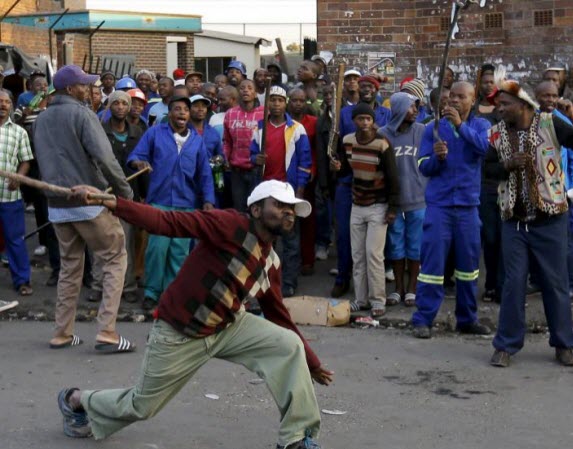There are no products in your shopping cart.
| 0 Items | £0.00 |


By Ayo Akinfe
(1) So over the last week, xenophobic attacks against fellow Africans have flared up again in South Africa. Poor South Africans have been attacking migrant workers, not expatriates or Europeans but fellow Africans. Spurred on by Inkatha Zulu nationalists, the attacks claimed three Nigerian lives this week
(2) Just as lions will attack those from other prides when food is scarce, so too will humans take their frustrations on fellow human beings in times of economic hardship. In Nigeria we are witnessing this with Fulani fundamentalism and with cries for secession and the creation of Biafra. Addressing the economic root causes of poverty is too complex and complicated so attacking “outsiders” is always the easy option to go for
(3) We cannot expect South Africa’s youth of today to remember the liberation struggle. As time goes on, it will become a distant memory just as few in Nigeria today remember the Zikist Movement and the fight against colonialism. In 20 years time, the youth of South Africa will be saying that Mandela has nothing to do with their future
(4) The number of South Africans living below the poverty line, identified according to apartheid-era social categories, was calculated in one study as 56% black, 27% coloured, 9% Indian, and 2% white. With such poverty, I am not surprised people are taking out their frustrations on their neighbours who they see as better off than them
(5) South Africa’s automotive industry accounts for about 10% of the country’s manufacturing exports, contributes 7.5% to GDP and employs around 36,000 people. However, are enough blacks benefiting from this?
(6)BMW, Ford, Volkswagen, Daimler-Chrysler, General Motors, Nissan and Toyota all have production plants in South Africa. Large component manufacturers with bases in the country are Arvin Exhaust, Bloxwitch, Corning and Senior Flexonics and there are also about 200 automotive component manufacturers in South Africa and more than 150 others that supply the industry on a non-exclusive basis. However, the industry is concentrated in two provinces, the Eastern Cape and Gauteng. As we all know, the Cape is populated by Asians and so-called coloureds
(7) Unlike most other sub-Saharan African countries, South Africa does not have a default agricultural position to fall back on. You cannot return to your village to farm if times are hard. South Africa’s agricultural industry contributes only around 5% of formal employment, relatively low compared with other parts of Africa, contributing only around 2.8% to GDP. Due to the aridity of the land, only 13.5% can be used for crop production, and only 3% is considered high potential land
(8) Since 1996, at the end of over 12 years of international sanctions, South Africa's GDP almost tripled to peak at $400bn in 2011 but has since declined to roughly $385bn in 2019. This though is inadequate for 60m people, especially as income distribution is very unfair
(9) South Africa is also suffering from a crisis in its mining sector, especially the gold industry. Mining's contribution to national GDP fell from 21% in 1970 to 6% in 2011. South Africa accounted for 15% of the world's gold production in 2002 and 30% as recently as 1993. The US Geological Survey estimated in that as of 2002, South Africa held about 50% of the world's gold resources, and 38% of reserves. In July 2018, however, the Mineral Council of South Africa announced that 75% of mines in the country are now unprofitable due to the decline in gold reserves
(10) In harsh times like this, the highly visible Nigerians will always be a target. Just as Irish Americans were once the target of pogroms in America and then later, the Irish joined in attacks against blacks. There will always be populist politicians willing to cash in on these hard times and make capital by celebrating our differences. As we seek to build the Africa of Nkrumah, Mandela, Nyerere, Cabral, Rodney, Fanon, Machel, Sankara, etc, we must learn to eschew celebrating our differences as they are there to keep us weak